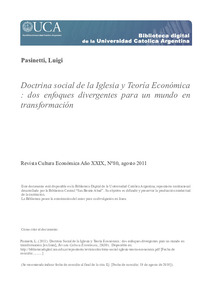Por favor, use este identificador para citar o enlazar este ítem:
https://repositorio.uca.edu.ar/handle/123456789/1851| Título: | Doctrina Social de la Iglesia y Teoría Económica : dos enfoques divergentes para un mundo en transformación | Autor: | Pasinetti, Luigi | Palabras clave: | TEORIA ECONOMICA; DOCTRINA SOCIAL DE LA IGLESIA; REVOLUCION INDUSTRIAL; MARXISMO; GLOBALIZACION; HISTORIA ECONOMICA | Fecha de publicación: | 2011 | Editorial: | Universidad Católica Argentina. Facultad de Ciencias Económicas. Escuela de Economía. Centro de Estudios en Economía y Cultura | Cita: | Pasinetti, L. (2011). Doctrina Social de la Iglesia y Teoría Económica : dos enfoques divergentes para un mundo en transformación [en línea], Revista Cultura Económica, 29(80). Disponible en: https://repositorio.uca.edu.ar/handle/123456789/1851 | Resumen: | Resumen: El artículo tiene por tema central la importancia de la intervención de la Iglesia en asuntos socio-económicos. El autor parte de dos interrogantes: el motivo por el cual se instauró la Doctrina Social de la Iglesia a finales del siglo XIX y no anteriormente, y las razones que condujeron al quiebre entre la Doctrina Social de la Iglesia y la teoría económica dominante. Para dar respuesta a estas cuestiones, Pasinetti se remonta a los inicios del Cristianismo, y realiza un análisis histórico del desarrollo de la teoría económica hasta la proclamación de la encíclica Rerum Novarum en 1891. El autor explica que ese corpus doctrinal surgió como resultado de tres eventos históricos: la Revolución Industrial, el impacto de la obra de Karl Marx, y la falla en formular una teoría económica capaz de resolver los problemas de un mundo nuevo. La Doctrina Social de la Iglesia, entonces, está llamada a superar estas dificultades ya que posee las herramientas necesarias para lograrlo. Abstract: This article’s central subject is the importance of the intervention of the Church in social-economic issues. The author starts from two questions: the reason why the Social Doctrine of the Church was established only by the end of the XIX century and not before, and the reasons that led to the breakdown between the Social Doctrine of the Church and the prevailing economic theory. To give an answer to these points, Pasinetti dates back to the origin of Christianity, and makes a historical analysis of the development of economic theory until the proclamation of the Rerum Novarum encyclical in 1891. The author explains that this doctrinal corpus came up from three historical events: the Industrial Revolution, the impact of Karl Marx’s work, and the failure in formulating an economic theory able to solve the problems of a new world. The Social Doctrine of the Church, therefore, is meant to overcome these difficulties because it possesses the tools required to achieve this task. |
URI: | https://repositorio.uca.edu.ar/handle/123456789/1851 | Disciplina: | ECONOMIA | Derechos: | Acceso Abierto | Fuente: | Versión original impresa en Sistema de Bibliotecas UCA: Revista Cultura Económica. Año XXIX. Nº 80, 2011 |
| Aparece en las colecciones: | CECON - 2011 Año XXIX nro. 80 |
Ficheros en este ítem:
| Fichero | Descripción | Tamaño | Formato | |
|---|---|---|---|---|
| doctrina-social-iglesia-teoria-economica.pdf | 362,88 kB | Adobe PDF |  Visualizar/Abrir |
Visualizaciones de página(s)
2.166
comprobado en 30-abr-2024
Descarga(s)
747
comprobado en 30-abr-2024
Google ScholarTM
Ver en Google Scholar
Este ítem está sujeto a una Licencia Creative Commons

